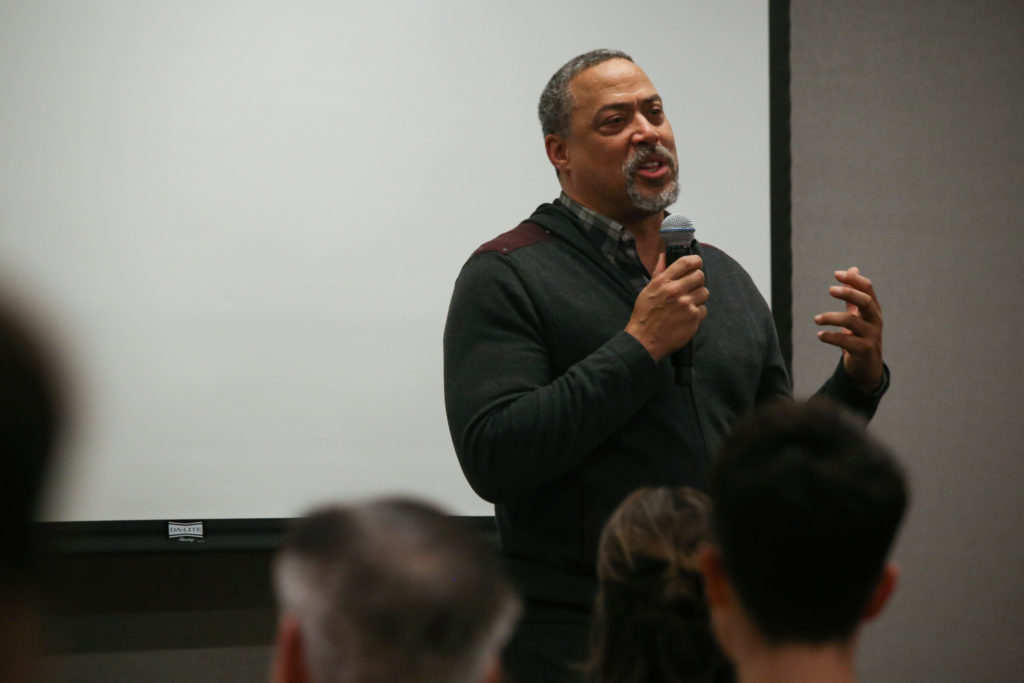More than 200 students came together Monday night to confront a topic often left out of the conversation about campus assault: toxic masculinity.
The event, organized by the Elliott School of International Affairs and held in the Smith Center’s Colonials Club, included a screening of the film “The Mask You Live In,” a documentary about students struggling with the confining nature of masculinity, and featured former NFL quarterback Don McPherson as a keynote speaker.
The discussion – the first of its kind at GW – was co-sponsored by the Student Association, the Interfraternity Council, the Panhellenic Association, GW Athletics, the Global Women’s Institute and the Multicultural Student Services Center – groups that have never before all collaborated on one event. Organizers also worked with Promundo, a gender justice organization that focuses on how men and boys can become partners in issues about gender inequality.
Acting Athletic Director Tanya Vogel introduced McPherson and said starting a conversation about toxic masculinity and the stress it puts on students is critical, especially for the athletic department.
“The importance of dialogue is something we talk about with our coaches and staff here,” Vogel said. “We are in a society right now where it’s all about discourse. We hear someone’s point of view and we don’t like it so we blast them on social media or we argue, close our ears and walk away.”
McPherson, who retired from professional football in 1994 and has since become an activist on gender issues, hosted an open discussion with the students in attendance, drawing on his own experiences and highlighting flaws he sees in trying to uphold a masculine ideal.
“The first thing we learn as men is we learn to man up, suck it up, don’t cry, don’t show emotion. But in that challenge, you are saying women are less than,” he said. “If you believe that other people are less than, it’s going to lead to violence against that group of people and then our cultural silence about it.”
[gwh_image id=”1050186″ credit=”Keegan Mullen | Staff Photographer
” align=”none” size=”embedded-img”]More than 200 students and community members attended the film screening and panel discussion.[/gwh_image]
McPherson added that he had never thought about his own masculinity until he was 29 years old and had retired from the world of professional sports.
“We as men need to lead a conversation with each other about this,” he said. “Masculinity is not some fixed thing. Masculinity is going to look different depending on how you express your wholeness.”
Coordinators of the event said they hope it leads to more partnerships with student groups to address campus assault and encourages male allies to stand against gender inequality and violence against women.
Abriana Bernstein, a senior studying international affairs, said she decided to bring an event on toxic masculinity to campus because she feels like GW, and colleges nationwide, have neglected to address the role of male allies in stopping violence against women. She added that the discussion was particularly relevant given the ongoing #MeToo and #TimesUp movements, where survivors have spoken out against sexual harassment and assault.
“We’re not planning on changing GW’s culture in two hours, but we are planning on starting a conversation,” she said.
Bernstein said she especially wanted to partner with Greek life leaders because as a one-time sorority member, she saw issues pertaining to assault and toxic masculinity firsthand in the Greek community.
“I think these issues are incredibly problematic in Greek Life, I think that’s a very objective issue,” she said. “I think it would be totally unfair to say these are issues only within Greek Life or athletics. They’re all over campus and this is a national issue.”
Danielle Cyr, the program associate for the Institute for African Studies who helped Bernstein plan the discussion and find co-sponsors, said the University should be a place to hold these conversations and get students involved in improving harmful gender expectations.
She said she and Bernstein are hoping to host another event on masculinity in March, again partnering with Promundo.
“This topic in and of itself I think is very uncomfortable for people to discuss, especially in light of everything that’s coming out in the media,” Cyr said. “We really thought, ‘if it’s not going to happen now, when will it happen?’”
Liz Konneker contributed reporting.





